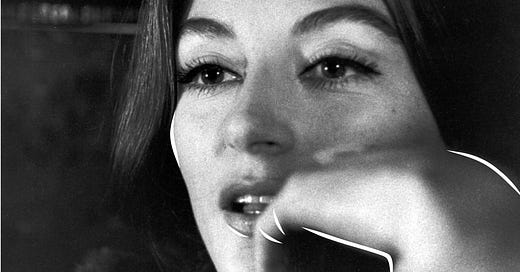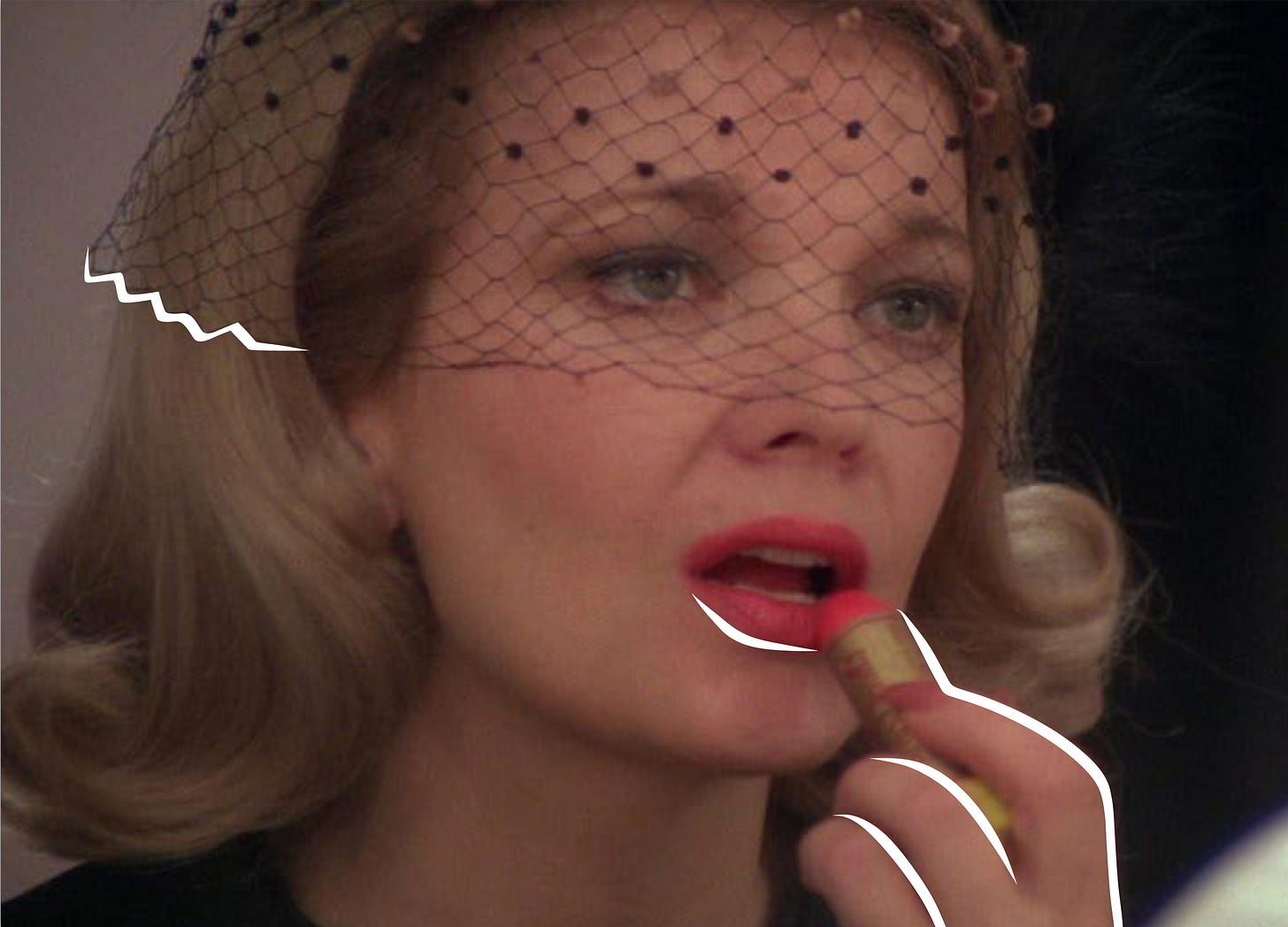The Nostalgia Bug
Saying goodbye to screen legends Anouk Aimée and Gena Rowlands comes with mind-bending moodiness.
I was brought up to control my emotions. To mask the pain, to invent ways to “control” bursts of overwhelming joy and happiness. But then, sometime around my eleventh birthday, fortunately enough, I discovered this place called a movie theater. It was just a three-stop subway ride away. I was allowed to stay for hours on end on Thursday afternoons accompanied (and schooled) by my aunt. My hauntingly charming aunt used to put her fanciest clothes and monstrous amounts of dizzying jasmine perfume on for those occasions. We would get the biggest popcorn box and drinks—and sometimes sneak a snack or two. The seats were cozy and nurturing. We would yell, giggle, cry, ask questions out loud. Being in the most magical place with a big screen to dive into gradually enabled me to let my guard down. To let my feelings come through and contour my surroundings. To be ready for complete absorption of those ripe, utterly unexpected moments life sporadically gifts us with. A cinephile’s life—such as the one I have done my very best to lead since then—centers around escapism, routinely exercising empathy, and combatting sweat-producing swirling thoughts at all times. The absence of rules and constraints to tempo and level of osmosis often leads to periods of deep internalization, apathy, and delicate despair.
This past year, we lost Anouk Aimée and Gena Rowlands. Although their artistic substances can be diagnosed as diametrically opposed, both had a nucleus identical in discipline, force, and clear creative steer. Upon receiving blow after blow, I carved out a discrete corner in my mind and found myself frequenting it more and more as the seasons changed. This space fostered my screaming and ranting incoherently about the current state and frame of acting as a profession. Spinning in slippery circles, begging for crumbs of enlightenment and, above all else, old-fashioned hope, the following question kept coming up: Why do the majority of actors of today let all possible distractions distract them?
Attempting to evaluate the bodies of work of Aimée and Rowlands is, to put it mildly, an impossible task. There needs to be a focal point that shouldn’t be the result of extracting a single role and labeling it as the “best” one since the most affecting and arresting bits can almost always be found in the messiness. Following bouts of self-questioning, sleep-starved, I attached myself to two movies characterized by inestimable intensity, though of different kinds, I keep returning to. No bathroom breaks, no screen time: the mind, body, and heart are wholly present and held captive.
Directed by Claude Lelouch, the 1966 French classic A Man and a Woman encapsulates the mystifying beauty of chance encounters and the importance of keeping one’s heart open at all times. In the film, Aimée brings a playful, poetic rhythm to the character of Anne Gauthier. She leaves room for error through her layered vulnerability and distinct lightness of being. The French actress completely transforms the concept of provocatrice, and the scope of her gentle genius touch only enlarges and develops within her subsequent portrayals throughout her storied career.
If there ever was a workaholic one can look up to, Gena Rowlands was the one. Ironically, her starring role in Opening Night, the 1977 psychological drama written and directed by Rowlands’s partner in life and art, John Cassavetes, examines the complexities behind absolute devotion to one’s profession. In it, Rowlands plays a disheveled and depressed actress who battles aging and fame. The chaotic beauty Rowlands injects into the character of Myrtle Gordon is a captivating component of the actress’s signature touch. Rowlands is unduplicatable because of her remarkable intrepidness. Scrolling through the American’s long, long, long, and complicatedly intriguing IMDb page, all her performances are evocative of a rare kind of untamable artistic spirit: the aggressive ability to possess (and when necessary devour) the space around you while keeping all your bitterness and sweetness intact.
Foundationally, both actresses never took themselves too seriously. They never dared to define their artistic vigor as iconic or one-of-a-kind. They never allowed themselves to become predictable caricatures who specialize in monetization. They possessed the tenacity to grow while building a legacy instead. Perhaps, back then, everyone had enough resources to have an identity as an actor. Perhaps the current climate is symptomatic of the paralyzing absence of original filmmakers. Audiences are becoming more and more visually illiterate and philosophically tone-deaf. It’s only logical that entertaining them can no longer be held to the same standards. Tragically, more or less, it’s all become clickbait.
Fitzgerald taught us we can’t repeat the past. Fitzgerald had a point. Nevertheless, I can’t help but let my melancholy get the better of me. It feels needed. Most actors of today are also influencers, brand ambassadors, entrepreneurs: their ever-looming parasocial presence birthing artificial intimacy without pause. For some reason, their debilitating lack of focus is celebrated. Their solipsistic hubris is both contained within and powered by social media. This is not my way of coming out as a Luddite. In all honesty, I want to play whatever tiny, grain-of-sand role I can in encouraging dialogue around how the past can inform the present. How we shouldn’t forget the masters and their struggle. How we should celebrate it by relentlessly examining it and taking notes. Arriving at significant conclusions and crafting out precious patterns that can be showered in new meaning—thus adding foreign colors to our collective psyche. It is not old Hollywood glamor that I’m referring to. It's the intense, heart-wrenching commitment and devotion to one’s craft that inevitably leads to the creation and sustenance of an authentic, commanding storyteller. It may fracture your sanity, but is it not worth it?






